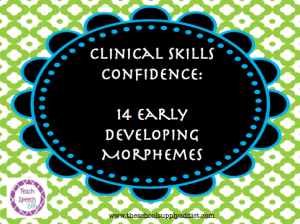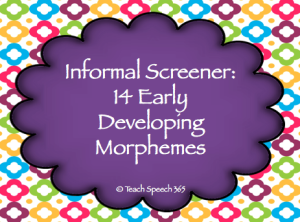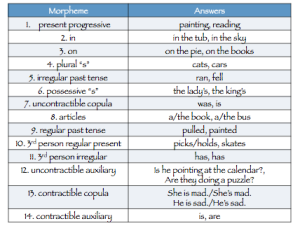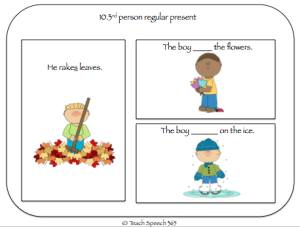Clinical Skills Confidence: 14 Early Developing Morphemes
Let’s take a short trip back to graduate school and discuss Brown’s Morphemes. These were identified by Roger Brown and detail morphological and syntactical elements of expressive language. Caroline Bowen has more details on her website, which can be found here.
There are 5 stages to Brown’s Morphemes. Mean Length of Utterance (MLU) is expected to increase as a child’s age increases. I frequently refer to these morphemes, especially with younger students. For whatever reason, I will always remember the difference between auxiliary and copula. Side note: you may receive puzzled looks if you throw these terms into everyday conversation! It’s ok, fellow SLPs understand. Auxiliary means supplementary so there is always another verb, which means it’s a copula if there is no other verb. Remember, these all refer to the “to be” verb. Contractible means it can be shortened (ex. he is swimming –> he’s swimming), while uncontractible means it can’t be shortened (ex. he was mad).
I have created an informal screener for these 14 morphemes. It’s been on my to-do list for awhile and I finally got around to it! Please note that this is not a standardized tool, it is simply meant to provide a baseline when looking at the expressive language of a child. Click the picture below to be taken to the link to download your screen (it’s FREE):
A tracking form is included:
An answer key for the screener is also included:
Each page looks at one morpheme. The box on the left contains a target visual and verbal example to read to the child. The boxes on the right are for the child to respond to. There are different formats for this, depending on what the morpheme is.
I truly hope this is something you can use! Feedback is always appreciated!!






I am a current grad student in SLP and will be entering the working world in spring of next year. I hope to work in a school setting too. I recently began following your blog through bloglovin and came across this Clinical Skills Confidence series. The posts, information, and freebies you provide in this series are SO helpful! Please keep up the great work and very informative posts! They are much appreciated. 🙂